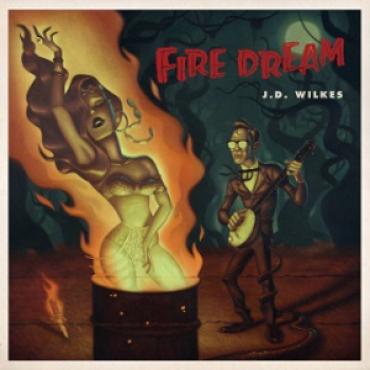Forget Sanders— J.D. Wilkes is the REAL Colonel!

I’ve never eaten J.D.’s chicken but I will bet it is as good as anything Sanders ever laid on the table. Then again, maybe if it was that good, he would have franchises all over the world too. The truth is that I don’t want him draining his talents over pressure cookers nor do I want him spreading the gospel according to Sanders. I want him right where he is— smack dab in the middle of a musical soap opera of his own making.
At the time of Th’ Legendary Shack Shakers’ The Tentshow Trilogy (a trio of albums including Believe, Pandelirium, and Swamplblood), when I found him, he was immersed in the Southern Gothic, and I mean immersed. He was then working on a film, Seven Signs, a documentary of not just the Deep South but of the various cultures he claimed largely misunderstood by the common man. Interviewing him, it soon became obvious I was as common as they come. He schooled me when I interviewed him (and the other members of Th’ Legendary Shack Shakers), pointing out the lack of insight most have whilst attempting to make sense of the backwoods attitudes— the snake-handling and bible thumping and every other thing I connected to what I then considered an oddball culture. Two minutes in, I stopped questioning and listened to a very well thought out view of culture-as-life, the vision of snake-handling and bible thumping giving way to a different view, that of surviving outside of today’s accepted cultural guidelines. (You can purchase a DVD of the film at http://www.jdwilkes.com/sevenSigns.htm…)
All things Legendary Shack Shakers changed my perspective about The South, the extreme differences between urban and rural, and a whole raft of other things. Wilkes had, in a few words, changed my vision of the world.
That vision centered upon the music of The Shack Shakers, of course, and after Tentshow coldcocked me, I began tossing aside my preconceptions of life in the good ol’ US of A. Things that used to make sense all of a sudden didn’t, things which had never made sense all of a sudden did. The music itself— obvious influences of bluegrass, rockabilly, tex-czech, gypsy, blues and a whole slew of other genres— twisted my ears into a knot I couldn’t untie, as if I wanted to. I immediately matched backward to the original Shack Shakers album (which Wilkes jokingly referred to as Rockabilly 101), Cockadoodledon’t to work my way toward Tentshow and put the band name on my watch-for list.
What with Wilkes’s many artistic talents (he writes, too, and has a recent book available titled The Vine That Ate the South), music has sometimes taken second seat to other projects, but he is mainly a musician and one well-versed in his craft. Fire Dream, the new album and supposedly his first solo effort, takes him one step further into what I now call Wilkesland, a musical dimension controlled by his many personalities. Think vamp (that thirties and forties concept championed by artists like Cab Calloway, rockabilly, cartoon music (you know— the music of cartoons in the late forties and early fifties based, as far as I can imagine, regional genres such as Tex-Czech and other cultural-based genres), swamprock, cajun and whatever else comes to mind. Wilkes can do it and often does.
There is so much more to Wilkes than his music. If you want to delve beyond the grooves of Fire Dream, I suggest you head back to Cockadoodledon’t and work your way forward. You will find a treasury of artistic endeavors way beyond what you even imagine. Here is a video promoting Fire Dream. Don’t look upon it as the example, look upon it as AN example, for, like I said, his journey encompasses so much more.
BTW, Fire Dream will be available on vinyl (and hopefully all other formats), February 16th.


